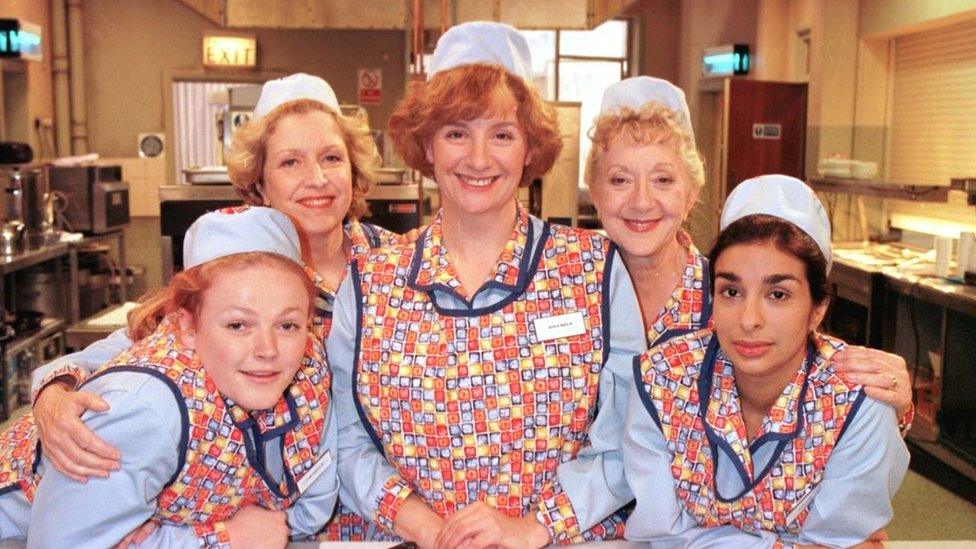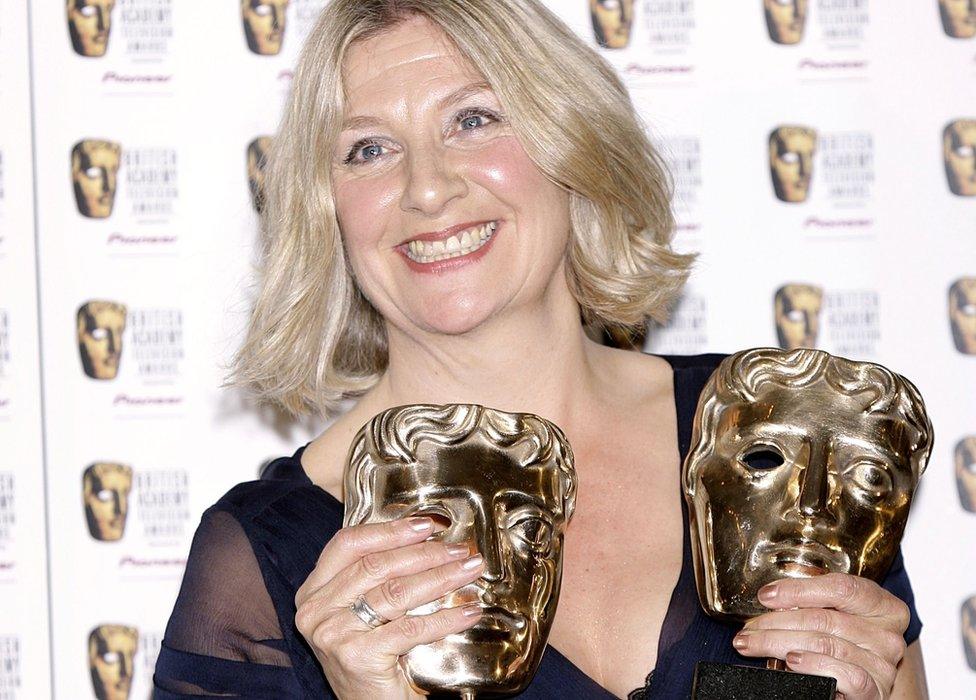Obituary: Victoria Wood
- Published

Victoria Wood continued writing and performing until late last year
Victoria Wood - who has died at the age of 62 - was one of the UK's best-loved entertainers with a career spanning more than four decades.
A Bafta award-winning comedian, actor, singer and writer, Wood was probably best known for her 1980s comedy series Victoria Wood: As Seen On TV and for her on-screen partnership with Julie Walters in the comedy sketch series Wood and Walters.
She wrote and starred in the hit BBC sitcom Dinnerladies and branched out into drama - writing and starring in the 2006 World War Two ITV drama Housewife, 49 - an adaptation of the diaries of Nella Last - which earned her two Baftas.
Wood was also popular for her live stand-up comedy shows, which were interspersed with her own compositions accompanied on the piano.
Made an OBE in 1997 and then a CBE later in 2008, Wood's much-admired talent lay in her brand of humour which was grounded in everyday life - full of astute observations of popular culture and the mundane elements of life.

Victoria Wood's early TV career was championed by Peter Eckersley of Granada
Born in Prestwich Village, Lancashire, Wood knew from an early age she wanted to be a performer even though her mother, she once said, "had no sense of humour".
The star began her showbusiness career in 1974, winning TV talent show New Faces while still an undergraduate at the University of Birmingham.
Her first big break was as a novelty act on the BBC's consumer affairs programme That's Life! in 1976 - one of the most-watched programmes on TV at the time. Wood established her particular brand of comedy in front of millions of viewers, who came to love her comic songs and piano playing.
Wood, who first met Julie Walters in the early 1970s, met the actress again in 1978 when they appeared together in the same theatre revue, In At The Death.
Its success led to the commission of Wood's first play, Talent, which won her a most promising new writer award and led to Peter Eckersly, the head of drama at Granada Television, inviting her to create a version for TV, starring Walters.
Three more plays followed, which again inspired Eckersley to approach Wood to create and star in a comedy sketch show.

Acorn Antiques from the series Victoria Wood: As Seen on TV has become a comedy classic and was made into a stage musical
Initially reluctant, Wood came round when her requirement that Walters share equal billing with her in the show was met. The resultant show was Wood and Walters which ran for seven episodes in 1982.
Around this time, the comedian also married the magician Geoffrey Durham - also known as the Great Soprendo - whom Wood had known since the age of 23. The couple married in March 1980 and went on to have two children before separating in 2002.
Wood once admitted she was never "very keen" on getting married, and for years she even refused to wear a wedding ring.
She once said: "Being a wife never appealed to me and I was so embarrassed when I got married that I didn't tell anyone for two years."
Wood's Granada series fell apart in 1984 following the death of her champion Eckersley and she left for the BBC, wooed by the promise of more creative control.
This freedom led to the now-renowned Victoria Wood: As Seen on TV, for which Wood chose a cast of actors and actresses she admired including Celia Imrie, Susie Blake, Patricia Routledge and, of course, Walters.

Dinnerladies ran on BBC One from 1998 to 2000
The series became most famous for its soap opera spoof Acorn Antiques, featuring Walters as Mrs Overall and Imrie as the sarcastic, upper-class Miss Babs. Its particular hilarity came from the wonky camera angles and the shaky sets and was thought to be based on the real-life ITV soap Crossroads.
The spoof has remained so popular it was adapted into an award-winning stage show in 2005 called Acorn Antiques: The Musical! The series also included some of Wood's best-loved humorous songs, such as The Ballad of Barry and Freda (Let's Do It).
A second series and a one-off special followed in 1987, and a special Audience with Victoria Wood show won her a Bafta in 1988.
Wood then began to move away from comedy sketch shows and went back to drama with the poignant, yet still smile-invoking, Pat and Margaret in 1994.
Again it co-starred Walters as the pair played sisters who were complete chalk and cheese.
It won Wood a Broadcasting Press Guild Award for best single drama and saw her compared to acclaimed playwright Alan Bennett.
In 1998, Wood wrote what was going to become the successful sitcom Dinnerladies, which again featured Walters and Imrie. Set in a workplace canteen, Wood's character was the head cook with Walters playing her embarrassing, dysfunctional mother and Imrie the workplace supervisor.

Victoria Wood counted five Baftas among the multiple accolades she won during her career
Dinnerladies confirmed its place as a popular sitcom by winning a National Television Award in 1999 and best TV comedy at the British Comedy Awards in 2000.
Wood kept busy with various television ventures including Victoria Wood's Big Fat Documentary in 2004 and ITV's Victoria Wood - Moonwalking, which followed 15,000 women walking to raise money for breast cancer. A special Bafta tribute followed in 2005.
Although the star continued to perform ad hoc comedy shows, Wood later moved further into dramatic roles.
She most notably wrote and starred in Housewife, 49 for ITV in 2006, in which she played the role of an introverted middle-aged character who discovers new confidence in Lancashire during World War Two. She also wrote a stage version in 2013.
Another notable TV drama role was in the BBC TV adaptation of the children's classic The Borrowers in 2011.
Wood continued writing and performing until late last year - she even won the Comic Relief Bake Off in 2015.
In December she starred alongside Timothy Spall in a Sky adaptation of Fungus the Bogeyman, saying in an interview at the time: "It's more to do with the work than the exposure, the fame or the money.
"Work is crucial to my life. My creativity is what defines me. I feel I can work as hard as I ever did."
- Published20 April 2016

- Published20 April 2016